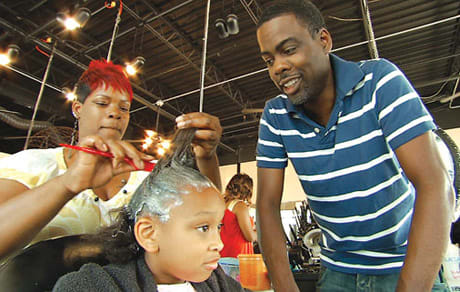Inspired by his young daughter asking, "Why don't I have good hair?," comedian Chris Rock steps into a Michael Moore-esque role in this documentary about the African American hair industry. Having internalized unattainable beauty standards that favour straight, silky hair, legions of women (and many men) turn to harsh chemical products to "relax" their hair, or spend exorbitant amounts of money on high-maintenance hair weaves.
The film is loosely structured around a hairstyling contest at the Bronner Brothers Hair Show in Atlanta, GA, the biggest trade show in this billion-dollar industry. Throughout Good Hair, Rock checks in with each of the stylist contestants as they prepare to present their elaborately choreographed haircutting routines. In between these segments, Rock and director Jeff Stilson delve into the historical, social and economic aspects of black hair culture.
They look at chemical relaxer, from its factory production through to scientific testing that shows how horrifyingly corrosive it is, and visit salons that apply it liberally, even on the youngest of customers. They investigate the origins of human hair weaves in India, how they're imported and sold and then collect stories of the economic, social and even sexual consequences of a weave-addicted culture.
The film also notes the decline of the black-owned businesses in an industry that almost exclusively serves the African-American community, with the exception of those salons and barber shops around the country that play a significant role in their communities.
Although they keep coming back to it, the hairstyling contest is the least interesting thing in the film. The personal stories and socio-economic implications are far more fascinating. Rock's trademark humour keeps this thorough exploration light and interesting along its many tangents. He's aided by a vast number of celebrity talking heads (from Maya Angelou to T-Pain and Al Sharpton to Ice-T), who share their hair, and horror, stories.
It's a smart and funny film that's critical of the industry while being respectful to the people involved in it, avoiding a big moralistic conclusion while raising important questions and concerns.
(Kinosmith)The film is loosely structured around a hairstyling contest at the Bronner Brothers Hair Show in Atlanta, GA, the biggest trade show in this billion-dollar industry. Throughout Good Hair, Rock checks in with each of the stylist contestants as they prepare to present their elaborately choreographed haircutting routines. In between these segments, Rock and director Jeff Stilson delve into the historical, social and economic aspects of black hair culture.
They look at chemical relaxer, from its factory production through to scientific testing that shows how horrifyingly corrosive it is, and visit salons that apply it liberally, even on the youngest of customers. They investigate the origins of human hair weaves in India, how they're imported and sold and then collect stories of the economic, social and even sexual consequences of a weave-addicted culture.
The film also notes the decline of the black-owned businesses in an industry that almost exclusively serves the African-American community, with the exception of those salons and barber shops around the country that play a significant role in their communities.
Although they keep coming back to it, the hairstyling contest is the least interesting thing in the film. The personal stories and socio-economic implications are far more fascinating. Rock's trademark humour keeps this thorough exploration light and interesting along its many tangents. He's aided by a vast number of celebrity talking heads (from Maya Angelou to T-Pain and Al Sharpton to Ice-T), who share their hair, and horror, stories.
It's a smart and funny film that's critical of the industry while being respectful to the people involved in it, avoiding a big moralistic conclusion while raising important questions and concerns.
